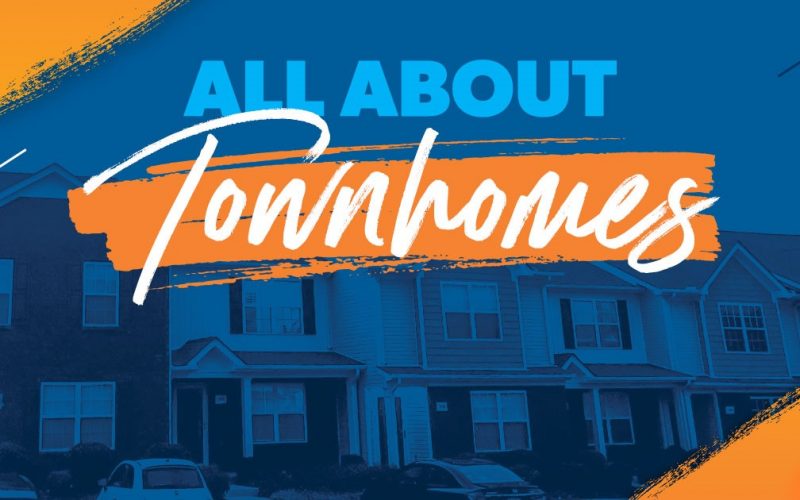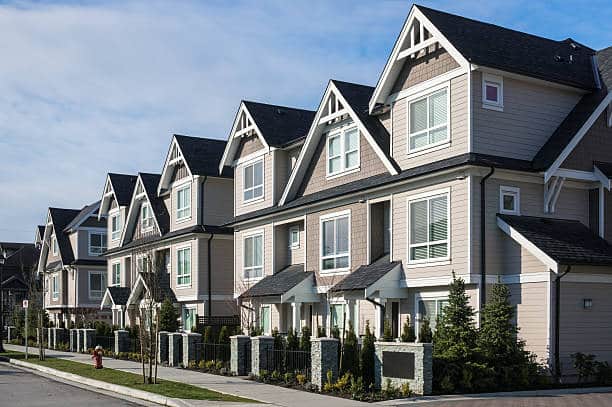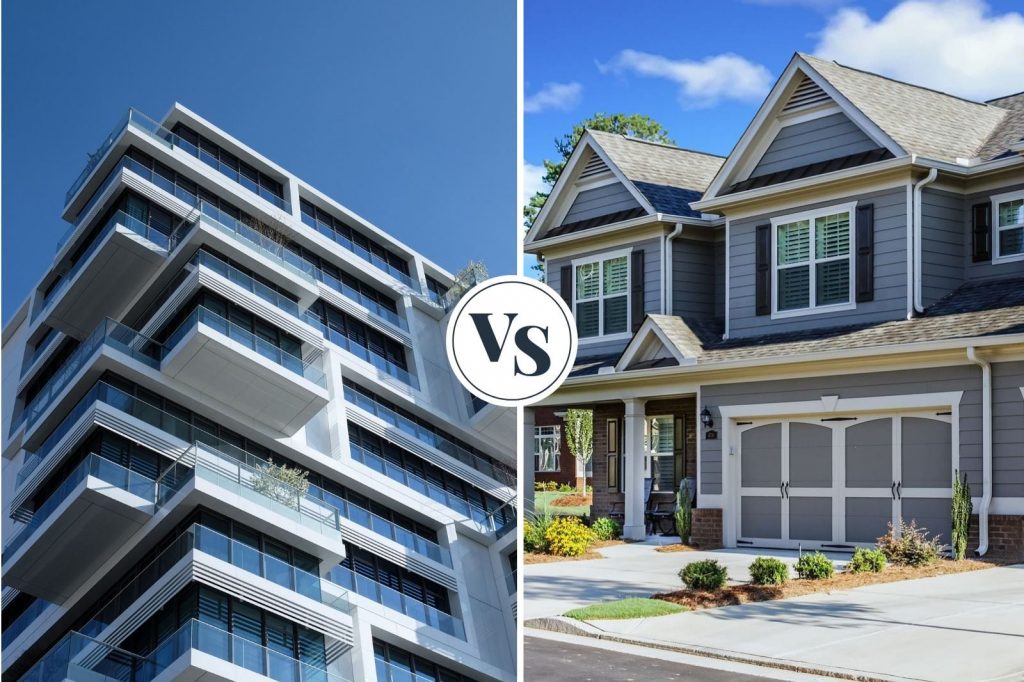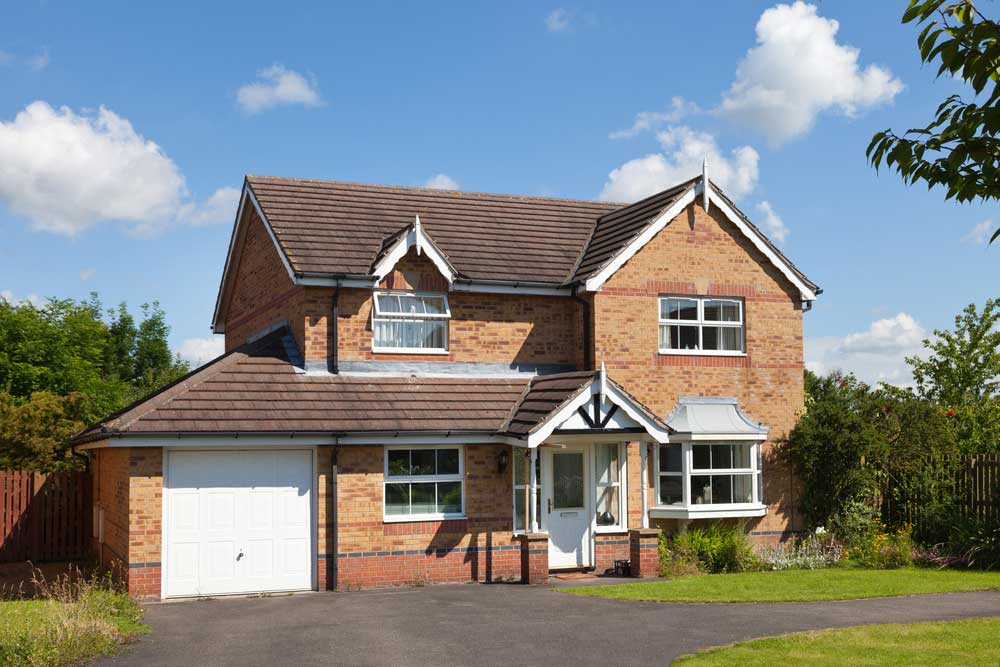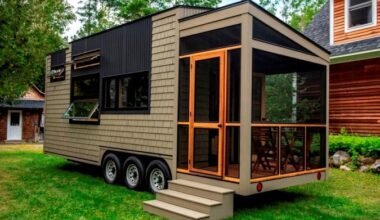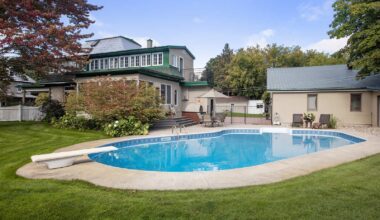Buying a home is a major decision that shouldn’t be taken lightly. It’s a significant milestone in an individual’s life and signifies a certain level of financial independence. But, several folks overlook townhouses, when it comes to purchasing a home. Unknown to them, there are a ton of benefits to living in a townhouse. However, this may not entirely be public knowledge as some of us may have the wrong idea of what a townhouse is in the first place. By the end of this article, you’d know for sure what a townhouse is, the major differences between townhouse apartments, single-family houses., and condos (townhouse vs apartment/house vs condo), and finally their pros and cons.
What is a townhouse?
Townhouse apartments are multi-story homes that share one to two walls with neighboring properties but have separate entrances.
Townhouses are frequently uniform dwellings developed in a discrete community with their own homeowners’ association in the suburbs. Newer urban townhouse apartments may have a consistent appearance and a community, but older city townhouses are more typical rowhomes that might span city blocks and have less restrictive or no HOAs.
Townhouses have existed for centuries, but the number of new townhouses built in recent years has been progressively falling. According to the National Association of Home Builders, townhouses account for 11% of new single-family construction in 2020, down from over 14% in 2008.
Townhouses, on the other hand, might be a terrific alternative for purchasers who want to be near to their neighbors.
The Benefits of Living in a Townhouse
When people think of residential options, they usually only consider single-family homes or apartments/condominiums. The idea of living in a townhouse does not normally occur to them. This could be due to a variety of factors. Some people despise the thought of shared walls, while others love the picture of single-family houses.
There is a stigma attached to living in a townhome, especially in some circles. Townhouse apartments, on the other hand, have a number of advantages that single-family residences do not. Let’s have a look at some of them:
#1. Workload reduction
One of the most enticing aspects of living in a townhouse is that you don’t have to put in as much effort in terms of maintenance. The community association takes care of the landscaping, making it a breeze.
You won’t need to mow your yard or pull weeds every weekend. Rather you’d spend your Saturdays relaxing after a week of hard work and admiring your front lawn’s immaculate state.
But then, even though pools are available in some single-family houses, they come with a hefty price tag. Owners of those residences are responsible for maintaining and cleaning their pools, which can be a particularly unpleasant experience during certain seasons. With a townhouse, you can avoid this issue. Residents of townhomes have access to a common community pool, which is kept in perfect condition by the HOA. This design is followed by all other shared facilities.
When you live in a townhouse, you get all of the amenities and have no responsibility for upkeep. A townhouse is your best bet if you want a place of your own but don’t want to be involved in the upkeep.
#2. The Services
There’s a simple reason why so many people visit resorts— the amenities. Resorts offer a variety of recreational amenities, ranging from large pools to outstanding gyms, so you won’t have to travel far to discover them. Townhomes are similar to resorts in this regard.
Townhouses include a wide range of shared amenities. On a hot summer day, what do you do? To cool off, go to the pool. Do you want to become in shape? It shouldn’t be too far to get to the gym. Also, BBQ pits, clubhouses, playgrounds, dog parks, tennis courts, and even car wash stations are examples of additional facilities.
In addition, the HOA is responsible for all maintenance and upkeep. Picnic areas and clubhouses can be reserved for parties to entertain guests. The nice part is that you can use these services all year long.
But then, the advantages of living in a townhome extend beyond recreational activities. Pest control, trash removal, and HVAC checks are usually included in the package. Despite the fact that your HOA community-based property includes assessment costs, these expenses are well worth it considering the advantages you receive in addition to a wonderful home.
#3. Cost-effectiveness
Townhouses, contrary to popular belief, give excellent value for money. They have been demonstrated to be cheaper than single-family homes in the same community. In fact, they are nearly always a less expensive option than single-family homes.
Furthermore, when you reside in a townhouse, you won’t have to pay exorbitant property taxes. Residents in townhomes pay cheaper property taxes than those who live in traditional residences because of the reduced lot size. When compared to condos, homeowner’s association fees are also typically lower.
A townhome has the same benefits as a single-family home. You have the option of financing the house or paying cash upfront. Plus, the land on which the townhouse is built is still yours. The selling procedure is essentially also the same. So, you have the option of selling it on your own or with the assistance of a realtor. You must, however, follow the protocol established by the HOA community norms and regulations.
#4. A Sense of Community
The sense of community and camaraderie that comes with living in a townhome is one of its most distinguishing features. Residents of townhomes typically share walls, which means they live close to one another. It’s difficult to go about your regular life without knowing your neighbor’s name when you’re so close.
When you live in a single-family home, you are more likely to feel alone. You may know your next-door neighbor or say hello to the family who lives across the street, but this configuration makes it difficult to build a true community. When you live in a townhouse, you are surrounded by others who live within a short distance of you. You can also find them in public locations and during events. Living in this manner virtually ensures a sense of affinity between and among neighbors.
#5. Convenient Location
When it comes to real estate, everyone understands the importance of location. In fact, it’s one of the most important factors for buyers when looking for a new home. Fortunately, a townhome also checks this box.
Townhouse apartments are frequently seen in densely populated and convenient areas. These developments are typically located near bustling areas with plenty of entertainment, dining, and retail options. Furthermore, schools and parks may be within walking distance of certain townhomes. As such, living in a townhouse is suitable for almost everyone, whether or not they have children.
#6. Increased Security
The extra security is perhaps one of the most appealing aspects of townhouse living. Fences and security systems are often used to keep potential intruders out of single-family homes. Townhomes, on the other hand, come with an added perk in the form of a security gate. Some townhomes have this feature, but not all. Meanwhile, if you require a security gate, seek a townhome development that has it.
Furthermore, because townhome communities are usually well-lit, you won’t have to worry about walking the streets late at night. Neighbors also have a protective instinct for one another, which can be reassuring. But then, splurging a bit more for added security is nearly common sense in today’s environment.
#7. Excellent Choice for Seniors
Living in a townhome as a retiree or senior citizen is a terrific way to enjoy freedom without the added burden of extra maintenance. HOA communities create a strong sense of belonging, which is especially important at this age.
The social gatherings are enjoyable and provide opportunities to meet new people. You can also look for neighborhoods that are specifically created for seniors, which will assist you in settling in quickly.
#8. You Don’t Have to Worry About External Home Improvements
Property management businesses are typically in charge of townhouse apartments. As a result, the HOA is responsible for the exterior maintenance of your home. If you think your house may need a fresh coat of paint or some new outside fittings, the management can help.
The application process is outlined in the community’s bylaws. In most cases, however, a formal application is required. You can be rest confident, however, that the job will be completed swiftly and without much difficulty.
Drawbacks with Living in a Townhouse
Beyond the numerous benefits of opting to stay in a townhouse, as always, there are a couple of drawbacks that come with making this choice. Try not to get lost in the benefits above. To a large extent, making a decision is dependent on a couple of factors including, lifestyle, financial budget, personal preferences, and so on.
Here are some—but not restricted to— challenges you may have to deal with if you decide to go for townhouse apartments;
#1. HOA:
Some people dislike having to live with restrictions imposed by an HOA, such as rules governing the colors of paint you can use on your patio or the types of windows you can install. HOAs also charge monthly fees, so you’ll need to consider that expenditure into your budget.
#2. Noise Pollution:
Since you’ll likely be in close proximity to your neighbors, you could have to cope with more noise and traffic than you would in a detached single-family house. For some individuals, this may be a huge put-off.
#3. Multi-Floor Living:
Multi-floor living may not be sustainable for everyone. According to Paul Gorney, a Realtor and team leader of eXp Realty in Chicago, “they are usually very vertical.” “It can be a problem for some senior citizens.”
Should You Buy a Condo, Townhouse, or House? (Townhouse vs Apartment/House vs Condo)
For first-time homebuyers, it’s often confusing to make a pick considering the variety of housing options available, particularly in urban regions. Each type of residence—condominium, townhouse, and detached home—has advantages and disadvantages. When determining which kind of home is ideal, buyers should consider their lifestyles and budgets, as well as how engaged they want to be in home maintenance.
Townhouse Apartment Practices
For starters, the ownership of a townhouse is its distinguishing attribute. Owners of townhouse apartments typically own the property on which their home is built, as well as any front and backyard areas, no matter how tiny. They also own the exterior of their house.
In addition, homeowner associations are common in townhouse developments (HOAs). Owners pay monthly dues to cover insurance and common area maintenance, as well as amenities like garbage pickup and snow removal. Some HOAs include restrictions about community aesthetics, such as the colors of exterior paint that are allowed and the types of fencing that can be installed.
Owners are also responsible for the upkeep and repair of their townhouses’ exteriors. A townhouse is ideal for people who want to be involved in the upkeep of their houses but don’t want the hassle of owning and maintaining a large property.
Condominium Practices
Condominiums allow you to be as hands-off as possible when it comes to home-ownership. Although some developers build condos that seem like multilevel townhouses, many of these types of units are visually indistinguishable from rental apartments. Condos are frequently less expensive than townhouses, in part, because they do not include land. The exterior of the apartments, as well as the property surrounding them, is designated a common area that is shared by all condo owners in the community.
Condos are defined by their monthly cost and maintenance. Condo owners, like townhouse owners, pay monthly HOA fees, albeit theirs may be much more.
The expense of unit exterior care; the insurance required to cover pricy components such as roofs, elevators, and parking structures; and services such as trash and snow removal are all covered by condo community HOA fees. Condos are ideal for folks who want to own real estate at a low cost and close to their place of work or pleasure.
Townhouse vs Apartment/House vs Condo
Detached homes, because they are built on their own lots, tend to give their owners the most flexibility when it comes to enhancing the structures or the lands that come with them. Detached homes differ in size from small to mansion-sized, but the freestanding structure is the distinguishing element.
Some detached properties, particularly in urban and suburban regions, may have HOAs, although the fees are typically low and cover only snow and trash disposal as well as shared road maintenance. Many detached residences, on the other hand, have no HOAs at all. Those provide you the most autonomy and freedom of choice.
Furthermore, people who desire spacious yards for their children to play in and space for extra constructions, such as a separate garage or workshop, choose detached houses. People who don’t mind yard labor or who want a large garden may consider buying a detached home.
However, unless the detached house is part of a community, it may lack amenities found in many condos and townhouses, such as a swimming pool, fitness center, or tennis court.
Condo vs Townhouse vs House: Key Differences
| Condominium | Townhouse | Detached House | |
| Initial cost | Usually, this is the most cost-effective housing alternative. | Usually less expensive than a detached dwelling. | Cost varies greatly depending on its size and location. |
| Ongoing fees | Homeowner association dues are paid on a monthly basis. | Homeowner association dues are paid on a monthly basis. | Generally none |
| What you own | Your private unit, but not the land or any common areas | The home plus the land it sits on and probably a yard | Your house plus the land under and surrounding it |
| Amenities | Condos frequently include shared amenities such as a swimming pool or a fitness center. | There may also be common amenities such as a swimming pool or a fitness center. | Amenities vary depending on what was available when you purchased the property or what you have since added. |
| Responsibilities | You are not responsible for grass mowing or other maintenance. | You are not responsible for grass mowing or other maintenance. | It is your responsibility to mow the l; lawns and grasses mowing, remove snow, and carry out repairs, among other things. |
| Autonomy | An owners’ association may enforce restrictions that you must observe. | An owners association’s rules may also apply to you. | Unless there is an owners association, you have complete freedom to do whatever you want within the confines of the law. |
Tips For Buying a Townhouse in 2023
The following are some tips to consider when buying a townhouse. It will help you put things in perspective when making a purchase.
#1. Think about your budget
Before you start looking for a townhouse, be sure you can easily afford it, just like any other property purchase. Make sure your budget covers not just the cost of the property but also, if possible, your HOA fees.
Keep in mind that townhouse apartments are susceptible to the same ebbs and flows as the rest of the real estate market, which means that prices have climbed dramatically in the last year. Because of the scarcity of available inventory, a townhouse, like other properties, will cost more in 2023.
#2. Create a community-wide “must-have” list
You most likely have a good idea of what you want from your home in terms of bedroom size, layout, and other features. When buying a townhouse, think about what amenities you’d like in the neighborhood, such as a pool, a less restrictive HOA, or a security gate at the entry.
#3. Listen with your ears perked up
Because of the shared walls, you might be able to hear what’s going on in your neighbor’s house, and vice versa. When you’re looking at townhouse apartments, pay attention to how much sound goes from the unit next door. If you can get an end unit, you’ll only have to deal with half the noise, but they usually have more windows and are therefore more expensive.
#4. Take a look around the common areas
If you plan on using a communal gym or a game room, go see them before you buy so you know precisely what you’re getting.
#5. Have a conversation with your future neighbors
When you’re thinking about buying a house, it’s always a good idea to talk to potential neighbors. It’s especially important if you’re buying a townhouse because you’ll be in close proximity to them. Inquire about what they like about the neighborhood and if there are any HOA issues you should be aware of.
#6. Go over the HOA rules
Homeowners associations have the power to impose restrictions on everything from the color of your front door to whether you can park in your own driveway (as opposed to your garage). Before you buy in any community, make sure you understand the HOA rules — and the financial commitment they entail.
According to Hoefer, “some people want more restrictions and a more uniform look throughout the community.” “Some people desire more liberty. The good news is that you can choose from a variety of HOA options to find the right one for you.”
#7. Consider the long term
While a townhouse may be right for you right now, multi-level living isn’t for everyone or at all stages of life. If you’re thinking about starting a family or are concerned about your capacity to navigate steps in the future, you should consider if you’ll be able to stay in the house.
Who Should Purchase What?
The choice between buying a townhouse or condo vs a detached house is mainly based on cost, convenience, and lifestyle.
Millennial-generation purchasers who have no homeownership experience and no time for home upkeep may benefit the most from starting in a condo or townhouse and then upgrading to a detached house only after learning how to maintain a property.
Detached houses are the best option for established buyers who need more room for their growing family and don’t want to be bound by HOA rules.
Older boomers, on the other hand, may benefit from the cheaper costs and the fewer responsibilities of living in a townhouse or condo rather than a detached home. Condos often require the least amount of maintenance, allowing owners to travel and enjoy their free time.
Key Highlights
- Ownership—which includes the ground the home is built on, the front and backyard areas, and the home’s exterior—defines townhouse apartments, which are often joined to other households.
- Condominiums offer the most hands-off approach to homeownership and are virtually indistinguishable from rental flats in terms of physical appearance.
- Because condos do not come with land, they are frequently less expensive than townhouse apartments; the exterior and land are considered common amenities shared by all inhabitants.
- Condo owners pay greater monthly homeowner association (HOA) fees than townhouse owners, partly to finance exterior care.
- Owners of detached homes often have the most flexibility in terms of altering the structures or the land that comes with them, but they may lack many of the amenities found in condos and townhouses apartments.
What Is the Difference Between a House and a Townhouse?
The difference between a house and a townhouse starts with the ownership of a townhouse. Owners of townhouse apartments typically own.
What Exactly Is a Townhouse?
Townhouse apartments are multi-story homes that share one to two walls with neighboring properties but have separate entrances.
What Is Difference Townhouse and Condo?
The difference between a townhouse and a condo is first in the ownership. Owning a condo means just buying the apartment whereas owning a townhouse includes both the land it sits on and the surrounding areas no matter how small.
What Are the Disadvantages of Living in a Townhouse?
Some disadvantages of living in a townhouse include the excessive HOA rules you have to follow, Noise pollution from neighbors.
What Is the Difference Between Townhouse and Villa?
A townhouse is a residential building with levels, while a villa was built by the Romans with a large building in the middle that had all the amenities and was surrounded by warehouses, stables, and other buildings.
